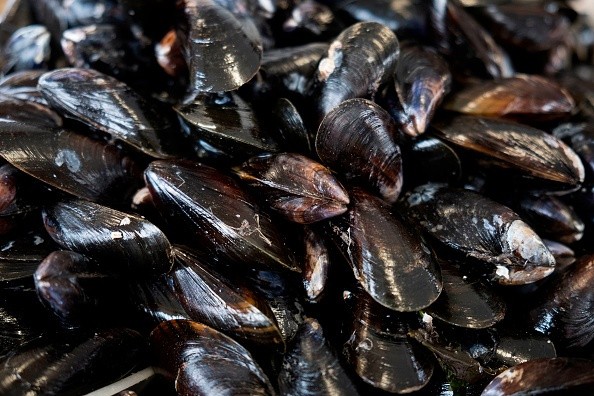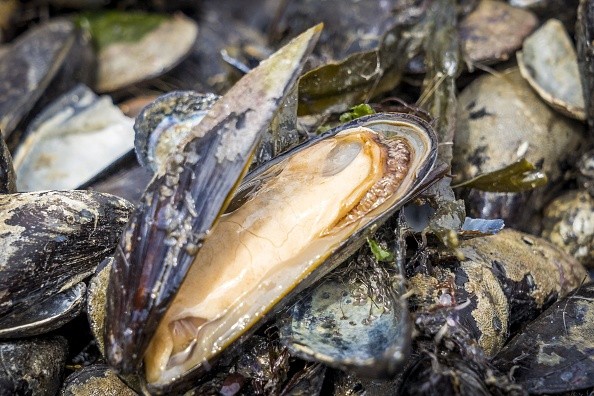Life abounds in the sea beneath our boat. Dr. Judith Brown and Andrew Airnes are pointing below the surface of Loch Slapin on the Isle of Skye on a beautiful Sunday morning, pointing to where they want to produce more than 100 tonnes of high-quality animal protein hung from four ropes.

A new generation of food producers considers mussel farming as having exciting promise for feeding a burgeoning population while restoring natural biodiversity that has been harmed or lost by pollution and unsustainable fishing methods, thanks in part to its amazing efficiency.
Mussel farming using hanging ropes generates a permanent marine habitat and ecology.
According to Airnes, it increases biomass by 3.6 times and biodiversity by 1.6 times.
Clingy Mussels
According to Brown, mussels cling to whatever they can find in the water; in this case, four 220 meter-long doubleheader ropes.
They discharge spat [juvenile mussels] when they are quite little, and they attach to items hanging in the water. Mussel aquaculture effectively provides the substrate on which they would typically adhere.
There are no further inputs save maintaining the ropes and spreading the mussels when they are young to spread them out - unlike practically all other farming systems.
Without any extra food, water, or treatments, the mussels develop at their natural density. It's "like walking from a plowed field into a forest," says John Holmyard of Offshore Shellfish, the UK's first offshore rope-cultured mussel farm off the Devon coast.
Several organisms live in and on the mussels. It may be a small number of worms or mollusks... or a large number of fish. We even had bluefin tuna on the farm last year, chasing the mullet, which track the crustaceans, which feed on the mussel sludge."
Investigating Ecologial Consequences

Dr. Emma Sheehan, an associate professor of marine ecology at Plymouth University, has been investigating Holmyard's ecological consequences since 2013, stating that scientists have been interested in seeing how these mussel farms interact with the marine ecology as a whole over time.
There were species there - many scavenging species - but there was little diversity.
"We've discovered that [the farm] is providing a home for a variety of species, including hundreds of thousands of brown crab, scallops, and other species with limited habitat."
Danielle Bridger and Llucia Mascorda Cabre, PhD students, are gathering data from the farm and comparing it to data from neighboring Lyme Bay control sites.
In comparison to the control regions, the total variety and richness of mobile species had grown by a third inside the farm after eight years.
Although it is still early days on Skye, Brown and Airnes claim that a thorough examination of their ropes reveals a robust and happy food chain from top to bottom. "All of a sudden, you have the entire trophic chain... from the larger fish through sharks and down to tiny mollusks."
We've observed large shoals of pollack, a lot of wrasse, shrimp, and lumpsucker when diving and checking out the spots. Small-spotted cat sharks have been observed around the locations. "Suspended mussel ropes create that environment," adds Brown.
Mussels play a crucial role in enhancing the overall quality of the water by providing food, shelter, and structure for other marine creatures.
Each mussel is thought to be capable of filtering 25 liters of water each day. "They eat nutrients and help to prevent eutrophication [overgrowth of plants and algae]. They maintain the water clean for everything else," Airnes explains.
A Sustainable Solution
Much of the water on Scotland's west coast is grade A, while significant swaths of the UK's shoreline are badly contaminated. Sheehan believes mussel farms can help restore ecosystems and natural filtration that existed before fishing.
Expanding meat vertically in the water column also opens up new options for alternate land use and solutions to the world's growing nutritional needs.
According to a recent report, there are no feed or antibiotic requirements for mussel culture, and the GHG [greenhouse gas] emissions connected with suspended mussel production are a fraction of those involved with terrestrial meat or even farmed salmon.
Small brown crabs scurry over ropes of healthy, adolescent mussels being taken from the crystal clear seas near Skye before falling back into the ocean. Cormorants dry their wings on the grey floats that hold the ropes floating in the water as a golden eagle flies overhead.
"We don't pretend for a second that what we're doing is a natural thing," Holmyard says later, "but it's a very decent analogy for it."
Related Article: Millions of Properties in California May Be Underwater by 2050; Lawmakers Suggest Solutions
For similar news, don't forget to follow Nature World News!
© 2026 NatureWorldNews.com All rights reserved. Do not reproduce without permission.





